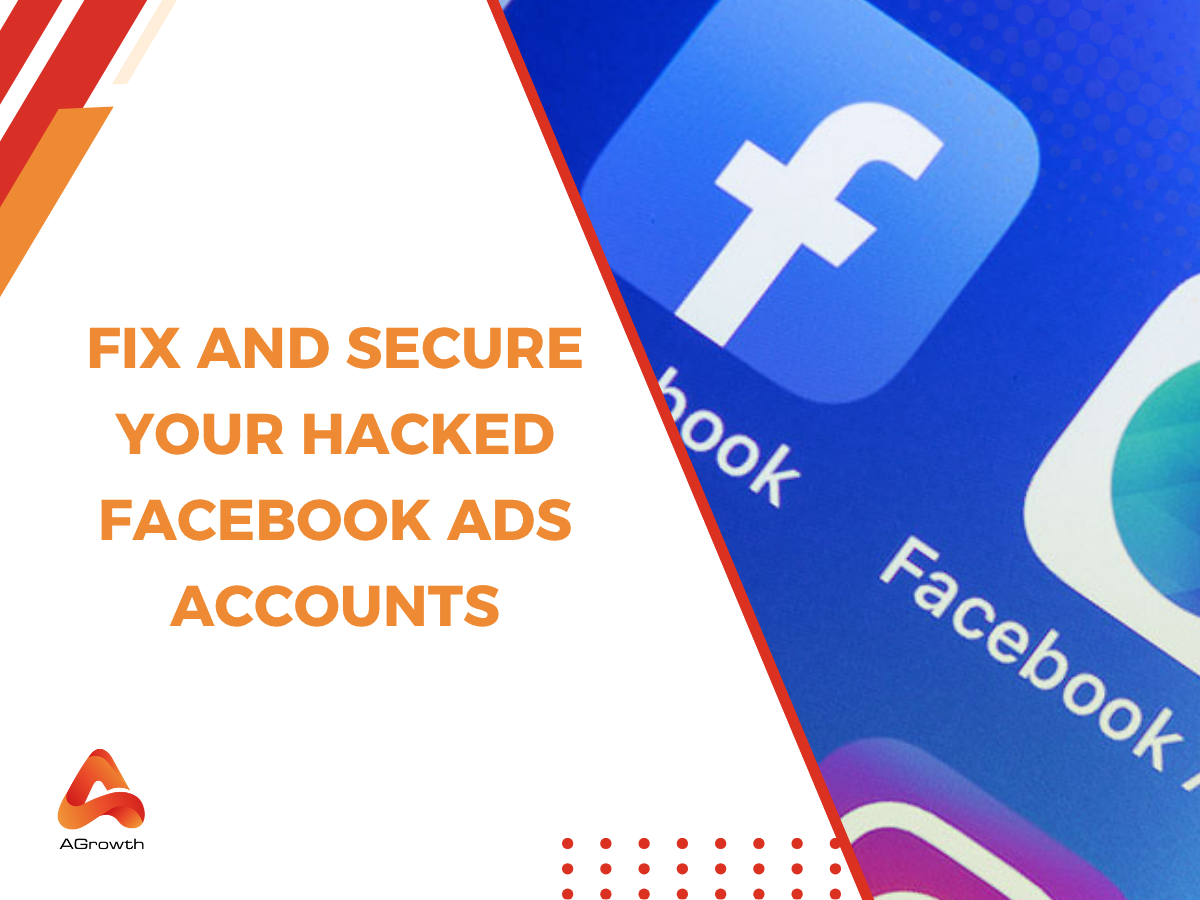
Table of Contents
Facebook Ads Account Hacked: How to Fix and Secure It
A hacked Facebook Ads account can drain your budget and damage your brand within hours. Cybercriminals often exploit compromised accounts to run unauthorized ad campaigns, steal sensitive data, or hijack payment methods.
Identifying and securing a hacked account requires swift, precise action. This article provides a step-by-step guide to fixing and securing your hacked Facebook Ads account. We’ll cover how to identify if your account has been compromised, take immediate recovery steps, report the hack effectively to Meta, and implement advanced security measures to prevent future breaches.
How to determine if my facebook ads account has been hacked
Account activity logs reveal unauthorized changes to your Facebook ads account. Check these logs by navigating to Ads Manager, selecting your account, and clicking on "Account Activity" to see a chronological record of all actions taken within your account.
Using your Facebook Ads Account ID, you can more easily identify which specific account was compromised if you manage multiple ad accounts
Strange campaign modifications indicate potential hacking activity. Look for:
-
New campaigns you didn't create
-
Unusual ad creative or copy
-
Modified targeting parameters
-
Unexpected changes to budgets or bidding strategies
-
Unfamiliar payment methods added to your account
Unexplained charges on your billing statements signal unauthorized access. Review your Facebook ads billing history by going to Payment Settings in Ads Manager and comparing charges with campaigns you've authorized. Multiple unexpected transactions suggest a compromised account.
Identify account settings changes
Modified account settings often appear when hackers access your account. Examine the following settings for unauthorized changes:
-
User permissions and admin roles
-
Notification preferences
-
Account spending limits
-
Payment methods
-
Business Manager connections
Automatic reactivation rules may be implemented by hackers. These rules automatically restart ads you've attempted to pause, allowing unauthorized spending to continue. Review your account's automated rules section in Ads Manager to identify and delete any suspicious automation.
What to do if your facebook ads account gets hacked
Taking immediate action when your Facebook ads account is compromised helps minimize damage and begins the recovery process.
What are immediate actions to take?
1. Contact Meta immediately
Contact Meta through their business support system at business.facebook.com/help. Prompt reporting increases your chances of resolving the issue quickly and potentially recovering unauthorized ad spend.
2. Disconnect all linked partners from your account to prevent the hack from spreading.
-
Access your Business Settings, click on "People" under the Users section
-
Revoke access for compromised accounts by toggling off permissions and clicking save.
3. Block all credit cards associated with your Facebook ads account.
Contact your bank or credit card company to freeze cards connected to your account and request new ones to prevent unauthorized transactions.
4. Delete unauthorized changes made by the hacker.
Check account settings thoroughly for any modifications, including automatic reactivation rules that could restart paused campaigns without your knowledge.
5. Set up security alerts for future protection.
Enable login alerts in your security settings to receive notifications about new device access, preventing unauthorized users from accessing your account again.
How to report a hacked ad account to Facebook
Here is how you can report you incident to Meta:
-
Use Meta's official reporting forms to document the hacking incident.
-
Navigate to business.facebook.com/help
-
Scroll down to the "Get Started" button, and follow the prompts to report your issue.
-
Select "Other Business Manager Issue" from the available options.
-
Provide comprehensive details about the unauthorized activity, including screenshots of suspicious campaigns and any communication from Facebook about account changes.
-
Preserve evidence of unauthorized activities before cleanup.
-
Do not delete suspicious campaigns until Facebook explicitly instructs you to do so, as these provide crucial evidence for their investigation.
-
Document all unauthorized spending for potential reimbursement. Create a detailed report of all charges made by the hacker, which may help you dispute these charges with both Facebook and your financial institution.
How long does it take for Facebook to respond to hacked ad accounts?
Response times vary significantly depending on account size and spending history. Meta typically prioritizes larger accounts, meaning small agencies or freelancers may wait several days to weeks for assistance.
The verification process often requires identity confirmation. Facebook may request a government-issued ID to verify your ownership of the account before processing recovery requests.
Account recovery outcomes differ based on individual circumstances. While some users regain full access quickly, others may face prolonged restrictions or permanent limitations on certain account features.
How to fix a hacked facebook ads account
Deactivate Unauthorized Ads
Unauthorized ads drain your budget and damage your brand reputation. Stop all unauthorized advertising campaigns immediately by accessing your Ads Manager and pausing any suspicious campaigns.
Pausing these campaigns prevents further financial loss while you work on securing your account. Review the campaign details to identify exactly which ads were created without your authorization for documentation purposes.
Remove Unauthorized Access
Unauthorized users often remain hidden in your account settings after a hack.
-
Check your account's user permissions by going to Business Settings > People
-
Review all individuals who have access to your ads account.
-
Look for unfamiliar names or suspicious access levels granted to legitimate users.
-
Toggle off access for any unauthorized users and save your changes to immediately revoke their permissions. This step prevents hackers from regaining access to your account after you've begun the recovery process.
Change Passwords and Carry out 2FA
Strong authentication serves as your primary defense against future attacks. Create a new password that includes a minimum of 12 characters with a mix of uppercase letters, lowercase letters, numbers, and special symbols.
Enable two-factor authentication by going to your account settings and selecting the Security and Login options. Two-factor authentication adds an extra security layer by requiring a verification code from your mobile device whenever someone attempts to access your account from an unrecognized device.
Monitor Account Activity
Regular account monitoring helps identify suspicious activities before major damage occurs. Review your account's activity log daily to spot unusual login locations, time patterns, or device types.
Facebook provides detailed information about each login attempt, including geographic location and device type. Set up login alerts through your security settings to receive immediate notifications whenever your account is accessed from a new device or location.
Establish Spending Limits
Spending limits protect your budget if hackers gain access even though other security measures. Set daily spending caps on your ads account by going to Account Settings > Spending Limits and entering your maximum daily budget.
These limits ensure that even if unauthorized access occurs, the potential financial damage remains controlled. Consider implementing additional approval steps for spending above certain thresholds to provide extra protection for your advertising budget.
How to find out who hacked your ads account on facebook
1. Identifying hackers through account activity logs
Navigate to your Ads Manager and review the Account Activity section to see all recent changes made to your campaigns and settings. This activity log displays timestamps, IP addresses, and the "Changed by" field that shows which user made each modification.
2. Login locations and devices
-
Access the Settings > Security and Login section of your Facebook account to view all locations and devices that have logged into your account recently.
-
Remove suspicious login sessions immediately by clicking the three dots next to each entry and selecting "Log Out."
3. Examining user access permissions
-
Review your Business Manager's Settings > People section to see a complete list of individuals with access to your ad account.
-
Look for recently added users you don't recognize or unexpected permission changes to existing users.
Permission escalations from viewer to admin status without your authorization indicate that either an account was compromised or someone granted unauthorized access.
4. Reviewing payment history and billing details
Examine your billing section for unauthorized charges, changed payment methods, or new billing addresses that don't match your company records. Hackers frequently modify these settings to funnel ad spend through their preferred channels or to test stolen credit cards. Document these discrepancies thoroughly as evidence for Facebook's support team.

How to secure your Facebook ads account?
Securing your Facebook ads account prevents unauthorized access and protects your advertising investments. Implementing robust security measures significantly reduces vulnerability to hacking attempts.
For business
Use strong passwords and enable two-factor authentication for your business Facebook accounts. Create complex passwords with combinations of uppercase letters, lowercase letters, numbers, and special characters for maximum security. Two-factor authentication adds an essential layer of protection by requiring a second verification step beyond just your password.
Monitor account activity regularly to detect suspicious logins or changes. Check login locations, devices, and timestamps in your account's security settings to identify unauthorized access attempts. Unusual activity patterns such as logins from foreign countries or at odd hours often indicate potential security breaches.
Review and adjust Business Manager access permissions periodically. Remove access for former employees, contractors, or agencies no longer working with your business to close potential security gaps. Limit administrative privileges to only those team members who absolutely require them for their job functions.
Conduct regular security audits of your Facebook ads account. Examine user permissions, payment methods, and account settings for any unauthorized modifications that might compromise your account security. These proactive checks help identify vulnerabilities before hackers can exploit them.
Keep all account information current and accurate to maintain account integrity. Update contact emails, phone numbers, and recovery options to ensure you can regain access if security issues arise. Outdated recovery information creates significant barriers to account restoration following security incidents.
For advertisers
Carry out unique passwords for each advertising platform you use professionally. Using different passwords prevents credential stuffing attacks where hackers apply stolen credentials across multiple platforms. Password management tools can help maintain and secure your diverse password collection without compromising convenience.
Enable login alerts and notifications for your advertising accounts. These alerts inform you immediately when someone accesses your account from a new device or location, allowing rapid response to potential breaches. Quick detection significantly reduces damage from unauthorized access.
Secure personal Facebook accounts connected to your advertising responsibilities. Review connected devices regularly and remove any unfamiliar connections to prevent phishing attempts. Personal account compromises frequently lead to business account breaches through connected permissions.
Train team members on cybersecurity best practices related to social media advertising. Educate staff about recognizing phishing attempts, suspicious messages, and other common attack vectors targeting advertisers. Security awareness training reduces human error-based vulnerabilities that technical measures cannot prevent.
Carry out spending limits and payment thresholds on advertising accounts. These financial guardrails minimize potential losses if unauthorized access occurs even though other security measures. Regular review of advertising expenditures helps identify unusual spending patterns that might indicate account compromise.
Protect your Facebook Ad Account better with Agrowth
With over a decade of experience in digital advertising, our expert team understands the challenges of keeping your campaigns secure and optimized. We don’t just fix problems; we proactively prevent them. Agrowth offers premium account management across top platforms and ensures your ads run smoothly without interruption.
Our 24/7 support and cutting-edge tools mean you’ll always stay one step ahead of security threats and performance pitfalls. Visit our website today to discover how we can protect your ad account and help your business thrive worldwide.
Frequently Asked Questions
How do I know if my Facebook ad account has been hacked?
Check your Ads Manager for unauthorized campaign changes, unusual ad creatives, or modified targeting parameters. Review account settings for unauthorized user permissions or payment methods. Monitor the "Changed by" field in account activity logs and watch for regional login notifications from unfamiliar locations. Also look for unexpected billing charges or automatic reactivation rules you didn't set.
Watch for regional login notifications from unfamiliar locations. If you’re unable to access Ads Manager or encounter a Facebook Ads Account Error, it could also signal a compromise.
How can a small business in New York City prevent future Facebook Ads account hacks?
For small businesses in New York City aiming to prevent future Facebook Ads account compromises, consider implementing the following measures:
-
Enable Two-Factor Authentication (2FA): Add an extra layer of security by requiring a second form of verification when logging in.
-
Regularly Update Passwords: Change your passwords periodically and ensure they are strong and unique.
-
Limit Account Access: Only grant account access to essential personnel and regularly review user roles and permissions.
-
Educate Your Team: Train employees to recognize phishing attempts and other common cyber threats.
-
Monitor Account Activity: Regularly check your account for any unusual activity or unauthorized changes.
-
Use Secure Networks: Avoid accessing your Facebook Ads account over public Wi-Fi networks to reduce the risk of interception.
How do I report a hacked Facebook ads account?
Use Meta's official reporting forms found in the Help Center or Business Support Portal. Document all unauthorized activities with screenshots and details of suspicious changes. Include evidence of unauthorized access like unknown IP addresses or login locations. Be specific about when you lost access and what changes were made without your permission.
How long does Facebook take to respond to hacking reports?
Response times vary based on account size and spending history. Larger accounts are typically prioritized and may receive support within 24-48 hours. Smaller accounts might wait longer, sometimes up to a week. Recovery outcomes differ based on individual circumstances and the extent of the hack.
How can I deactivate a hacked Facebook ads account?
Access Ads Manager to turn off all suspicious campaigns created by hackers. Check the account's change history to monitor for reactivation attempts. Review account rules for unauthorized modifications that might trigger automatic reactivations. Remove suspicious admin access from Business Manager and limit account access to only the primary owner.
How can I secure my Facebook ads account against future hacks?
Use strong, unique passwords and enable two-factor authentication. Regularly monitor account activity and review Business Manager access permissions. This helps reduce the risk of triggering a Facebook Ads Account Restriction, especially if unfamiliar users were previously added. Conduct security audits to identify vulnerabilities. Use different passwords for each platform and enable login alerts. Train team members on cybersecurity best practices and set spending limits to minimize potential losses.
How do I identify who hacked my Facebook ads account?
Review account activity logs to see unauthorized actions and who made them. Check login locations and devices for unfamiliar access points. Examine user access permissions for unauthorized changes and review payment history for suspicious charges. While Facebook may not reveal specific hacker identities, submitting a formal report can provide insights into the breach.
Are there any legal implications in the US if my Facebook Ads account is hacked?
In the US, if your account is compromised and used for fraudulent activities, you may have legal recourse:
-
Report to local authorities: In the US, contact the Federal Trade Commission (FTC); in the UK, report to Action Fraud.
-
Notify your financial institution: They can assist in mitigating financial losses.
-
Consult legal counsel: Seek advice on potential liabilities and steps to protect your business.
What should I do if my Facebook Ads account was hacked and used to run unauthorized campaigns in London?
If your Facebook Ads account has been compromised and used to run unauthorized campaigns targeting London or other UK regions, take the following steps:
-
Report Unauthorized Activity to Facebook: Navigate to Facebook's Business Help Center and report the suspicious activity.
-
Contact Your Payment Provider: Inform your bank or credit card company about the unauthorized charges to initiate a dispute process.
-
Report to Action Fraud: In the UK, report the incident to Action Fraud, the national fraud and cybercrime reporting center, to obtain a crime reference number.
-
Secure Your Account: Change your Facebook password, enable two-factor authentication, and review account roles to remove any unauthorized users.
-
Monitor for Further Activity: Keep an eye on your account for any further suspicious activity and maintain open communication with Facebook support for updates on your case.
For ongoing protection and professional management, working with a trusted Facebook Ads Account Agency like Agrowth ensures your campaigns stay safe, optimized, and secure.
Further reading:










Your comment